Botanical Extract Market
Botanical Extract Market Size and Share Forecast Outlook 2025 to 2035
Botanical extract market is projected to grow from USD 12.5 billion in 2025 to USD 21.0 billion by 2035, at a CAGR of 5.3%. Herbs will dominate with a 40.0% market share, while food & beverage will lead the application segment with a 45.0% share.
Botanical Extract Market Forecast and Outlook 2025 to 2035
The global botanical extract market is expected to reach USD 21.0 billion by 2035, recording an absolute increase of USD 8.5 billion over the forecast period. The market is valued at USD 12.5 billion in 2025 and is set to rise at a CAGR of 5.3% during the assessment period.
The overall market size is expected to grow by nearly 1.7 times during the same period, supported by increasing demand for natural ingredient solutions across food and dietary supplement sectors, driving adoption of advanced extraction technologies and expanding investments in botanical processing operations and natural product manufacturing globally. Raw material supply volatility and complex regulatory frameworks may pose challenges to market expansion.
Quick Stats for Botanical Extract Market
- Botanical Extract Market Value (2025): USD 12.5 billion
- Botanical Extract Market Forecast Value (2035): USD 21.0 billion
- Botanical Extract Market Forecast CAGR: 5.3%
- Leading Source Type in Botanical Extract Market: Herbs
- Key Growth Regions in Botanical Extract Market: Asia Pacific, Europe, and North America
- Top Players in Botanical Extract Market: Indena, Naturex (Givaudan), Martin Bauer, Dohler, Kalsec, Synthite, Arjuna, Vidya Herbs, Sabinsa, Bio Botanica
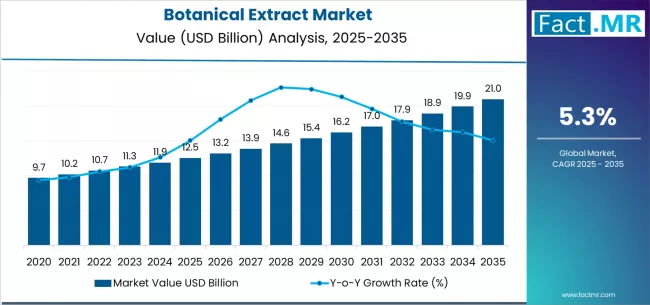
Botanical Extract Market Year-over-Year Forecast 2025 to 2035
Between 2025 and 2030, the market is projected to expand from USD 12.5 billion to USD 16.2 billion, resulting in a value increase of USD 3.7 billion, which represents 43.5% of the total forecast growth for the decade. This phase of development will be shaped by rising demand for natural ingredient solutions and health-focused formulations, product innovation in extraction technologies and processing methods, as well as expanding integration with food manufacturing and dietary supplement production systems. Companies are establishing competitive positions through investment in botanical research and development, high-performance extraction technologies, and strategic market expansion across food and beverage, dietary supplements, and cosmetics applications.
From 2030 to 2035, the market is forecast to grow from USD 16.2 billion to USD 21.0 billion, adding another USD 4.8 billion, which constitutes 56.5% of the overall ten-year expansion. This period is expected to be characterized by the expansion of specialized botanical formulations, including advanced extraction systems and integrated natural ingredient solutions tailored for specific application requirements, strategic collaborations between extract manufacturers and end-user industries, and an enhanced focus on regulatory harmonization and quality standardization practices. The growing focus on natural health solutions and clean label products will drive demand for comprehensive botanical extract solutions across diverse industry applications.
Botanical Extract Market Key Takeaways
| Metric | Value |
|---|---|
| Market Value (2025) | USD 12.5 billion |
| Market Forecast Value (2035) | USD 21.0 billion |
| Forecast CAGR (2025-2035) | 5.3% |
Why is the Botanical Extract Market Growing?
The botanical extract market grows by enabling manufacturers to incorporate natural ingredient solutions while accessing advanced extraction technologies without substantial infrastructure requirements. Food and supplement companies face mounting pressure to meet consumer demand for natural products and comply with strict quality regulations, with botanical extracts typically providing 80-95% active compound concentrations comparable to synthetic alternatives, making natural solutions essential for competitive market positioning. The consumer goods industry's need for clean label products and application-specific natural ingredients creates demand for comprehensive botanical extract solutions that can provide superior functionality, maintain consistent potency, and ensure regulatory compliance without compromising product standards or consumer expectations.
Government initiatives promoting natural product development and health-focused manufacturing drive adoption in food and beverage, dietary supplements, and cosmetics applications, where ingredient quality has a direct impact on product efficacy and consumer acceptance. The supply chain complexity constraints during sourcing phases and the expertise requirements for botanical extract application may limit accessibility among smaller manufacturers and developing regions with limited technical infrastructure for natural ingredient processing systems.
Segmental Analysis
The market is segmented by source, application, form, and region. By source, the market is divided into herbs, spices, flowers, and fruits/others. Based on application, the market is categorized into food & beverage, dietary supplements, and cosmetics. By form, the market includes powder and liquid. Regionally, the market is divided into Asia Pacific, Europe, North America, and other key regions.
By Source, the Herbs Segment Accounts for a Dominant Market Share
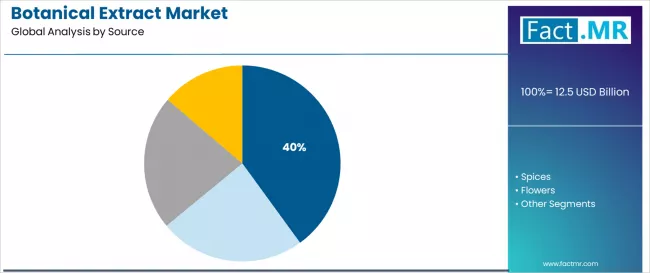
The herbs segment represents the dominant force in the market, capturing approximately 40.0% of total market share in 2025. This established source category encompasses solutions featuring sophisticated herbal extracts and bioactive plant compounds, including standardized herbal extracts and specialized phytochemical systems that enable superior therapeutic properties and functional benefits across all application types. The herbs segment's market leadership stems from its superior bioactivity capabilities, with products capable of handling diverse formulation challenges while maintaining consistent potency standards and operational reliability across all manufacturing environments.
The spices segment maintains a substantial 25.0% market share, serving manufacturers who require flavor enhancement with enhanced aromatic features for specialized formulations and culinary applications. These products offer premium extract solutions for taste and fragrance applications while providing sufficient bioactive capabilities to meet quality standards and functional demands. The flowers segment accounts for approximately 20.0% of the market, serving specialized extract applications. The fruits/others segment captures 15.0% market share, serving niche applications including fruit-derived extracts, vegetable extracts, and specialized botanical applications across various industry sectors.
Key technological advantages driving the herbs segment include:
- Advanced extraction technologies with integrated concentration mechanisms that maximize active compound recovery and ensure consistent potency performance
- Multi-application compatibility options allowing deployment across different formulation systems without bioactivity loss requirements
- Enhanced stability features, maintaining active compound integrity across various processing conditions while preserving therapeutic efficacy
- Improved standardization profiles enabling consistent quality delivery and enhanced regulatory compliance requirements
By Application, the Food & Beverage Segment Accounts for the Largest Market Share
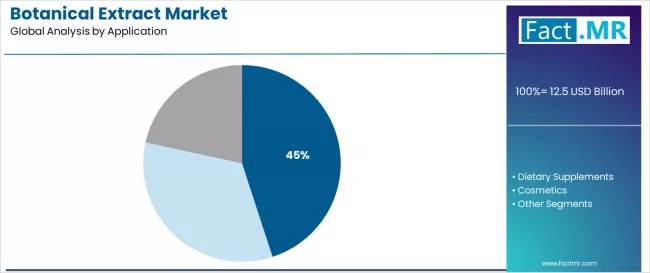
Food & beverage applications dominate the application segment with approximately 45.0% market share in 2025, reflecting the critical role of botanical extracts in supporting global food manufacturing and beverage formulation operations worldwide. The food & beverage segment's market leadership is reinforced by increasing natural ingredient demand, clean label trends, and rising requirements for functional food diversity in comprehensive product programs across developed and emerging markets.
The dietary supplements segment represents the second-largest application category, capturing 35.0% market share through nutraceutical applications for health supplements, wellness products, and specialized therapeutic formulations. This segment benefits from growing consumer preference for natural health solutions that meet specific wellness requirements, efficacy standards, and regulatory protocols in competitive supplement markets.
The cosmetics segment accounts for 20.0% market share, serving specialized applications including skincare formulations, anti-aging products, and natural beauty applications across various cosmetic sectors.
Key market dynamics supporting application growth include:
- Food & beverage expansion driven by natural ingredient demand and clean label trends, requiring specialized processing facilities in emerging markets
- Dietary supplements modernization trends require high-quality, standardized extracts for efficacy consistency and regulatory compliance
- Integration of cosmetic technologies enabling precision formulation development and quality systems
- Growing focus on application diversity driving demand for comprehensive, multi-sector botanical extract solutions
By Form, the Powder Segment Accounts for the Largest Market Share
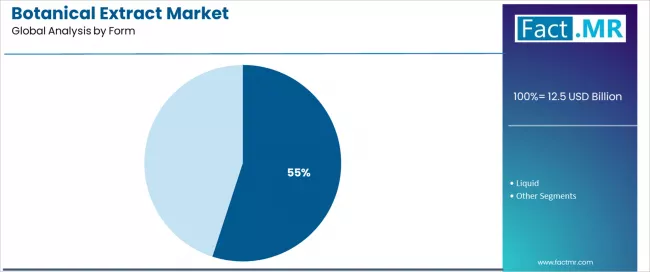
Powder form dominates the form segment with approximately 55.0% market share in 2025, reflecting the critical role of powder extracts in supporting global manufacturing operations and formulation convenience worldwide. The powder segment's market leadership is reinforced by increasing processing efficiency, storage advantages, and rising requirements for formulation diversity in comprehensive manufacturing programs across developed and emerging markets.
The liquid segment represents a substantial form category, capturing 45.0% market share through liquid extract applications for direct incorporation, beverage formulations, and specialized processing applications. This segment benefits from growing industry preference for ready-to-use extracts that meet specific processing requirements, mixing standards, and application protocols in competitive manufacturing markets.
Key market dynamics supporting form growth include:
- Powder expansion driven by storage efficiency and processing convenience, requiring specialized drying facilities in emerging markets
- Liquid adoption trends require high-quality, standardized processing for consistency and application compliance
- Integration of advanced processing technologies enabling precision extract development and quality systems
- Growing focus on form diversity driving demand for comprehensive, multi-format botanical extract solutions
What are the Drivers, Restraints, and Key Trends of the Botanical Extract Market?
The market is driven by three concrete demand factors tied to natural product outcomes. First, increasing consumer preference for natural ingredients and clean label products create increasing demand for botanical extract systems, with natural product consumption expanding by 8-12% annually in major consumer markets worldwide, requiring comprehensive botanical processing infrastructure. Second, government initiatives promoting natural product development and health-focused manufacturing drive increased adoption of botanical extract solutions, with many countries implementing natural ingredient goals for product advancement by 2030. Third, technological advancements in extraction technology and processing systems enable more effective and cost-competitive natural solutions that improve bioactivity levels while enhancing product functionality and consumer appeal capabilities.
Market restraints include raw material supply volatility for botanical sources that can create uncertainty for new market entrants developing comprehensive extraction capabilities, particularly in developing regions where access to quality plant materials remains limited. Complex regulatory frameworks and compliance requirements pose another significant challenge, as botanical extracts demand extensive safety documentation and efficacy validation, potentially causing increased development costs and market entry complexities. Quality standardization and testing requirements across different regions create additional operational challenges for product adoption, demanding ongoing investment in analytical testing and botanical extract quality programs.
Key trends indicate accelerated adoption in Asia-Pacific markets, particularly India and China, where natural product expansion and manufacturing requirements drive comprehensive botanical extract adoption. Technology integration trends toward advanced extraction systems with enhanced purification, bioactivity assessment tools, and integrated quality solutions enable proactive manufacturing approaches that optimize extract performance and minimize quality variation. The market thesis could face disruption if significant advances in synthetic alternative technologies or major changes in consumer approaches reduce reliance on traditional botanical-based natural ingredient systems.
Analysis of the Botanical Extract Market by Key Country
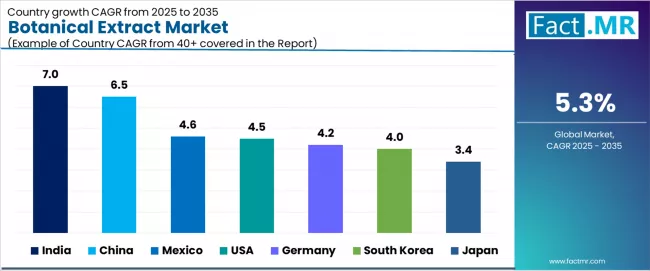
| Country | CAGR (2025-2035) |
|---|---|
| India | 7.0% |
| China | 6.5% |
| Mexico | 4.6% |
| USA | 4.5% |
| Germany | 4.2% |
| South Korea | 4.0% |
| Japan | 3.4% |
The market is expanding rapidly, with India leading at a 7.0% CAGR through 2035, driven by natural product infrastructure expansion, government-backed herbal programs, and advanced extraction technology adoption. China follows at 6.5%, supported by traditional medicine modernization and large-scale botanical processing initiatives. Mexico records 4.6%, reflecting rising adoption of natural extract solutions in manufacturing centers. The USA posts 4.5%, anchored by dietary supplement markets and federal natural product programs. Germany grows at 4.2%, maintaining leadership in extraction innovation and EU compliance. South Korea advances at 4.0%, emphasizing technology integration, while Japan grows steadily at 3.4%, focusing on advanced processing standards.
India Leads Global Market Expansion
India demonstrates the strongest growth potential in the market with a CAGR of 7.0% through 2035. The country's leadership position stems from botanical infrastructure expansion, government-backed Ayurvedic development programs, and increasing extraction expertise driving the adoption of advanced botanical extract solutions. Growth is concentrated in major processing centers, including Mumbai, Bangalore, Chennai, and Ahmedabad, where extraction facilities and pharmaceutical manufacturing centers are implementing advanced botanical systems for enhanced product quality and operational efficiency. Distribution channels through extract distributors and pharmaceutical networks expand deployment across specialized processing projects and comprehensive natural product initiatives. The country's National AYUSH Mission provides policy support for herbal modernization, including advanced botanical extract adoption.
Key market factors:
- Botanical expansion concentrated in herbal hubs and specialized processing zones with comprehensive development programs
- Government support through AYUSH programs and botanical infrastructure initiatives
- Comprehensive extraction technology ecosystem, including established suppliers with proven track records
- Technology integration featuring advanced processing platforms, standardization systems, and quality optimization technologies
China Emerges as High-Growth Market
In Beijing, Shanghai, Guangzhou, and Hangzhou, the adoption of comprehensive botanical extract solutions is accelerating across manufacturing networks and specialized processing facilities, driven by traditional medicine modernization targets and government natural product programs. The market demonstrates strong growth momentum with a CAGR of 6.5% through 2035, linked to comprehensive manufacturing modernization and increasing focus on advanced extraction solutions. Chinese manufacturers are implementing advanced botanical systems and integrated processing platforms to enhance product quality while meeting growing demand in expanding dietary supplement and functional food sectors. The country's Healthy China initiatives create persistent demand for botanical extract solutions, while increasing focus on traditional medicine advancement drives adoption of advanced extraction systems.
Key development areas:
- Manufacturing facilities and processing centers leading botanical technology adoption with comprehensive modernization programs
- Industrial channels providing integrated solutions with 85% extraction efficiency improvement rates
- Technology partnerships between botanical companies and manufacturing enterprises are expanding market reach
- Integration of advanced processing technologies and comprehensive quality management systems
Mexico Shows Strong Regional Leadership
Mexico's market expansion is driven by diverse agricultural demand, including specialized botanical operations in Jalisco and Michoacán, and comprehensive natural product adoption across multiple agricultural states. The country demonstrates promising growth potential with a CAGR of 4.6% through 2035, supported by federal government agricultural investment programs and state-level botanical development initiatives. Mexican processors face implementation challenges related to technology financing constraints and technical expertise availability, requiring phased deployment approaches and support from international suppliers. Growing export demand and natural product requirements create compelling business cases for botanical adoption, particularly in agricultural areas where extraction quality has a direct impact on market competitiveness.
Market characteristics:
- Specialized food and supplement segments showing fastest growth with 20% annual increase in botanical utilization
- Regional expansion trends focused on agricultural areas in central and southern states
- Future projections indicate the need for local technical support infrastructure and botanical specialist training programs
- Growing focus on natural product excellence and international competitiveness in processing operations
Germany Demonstrates Technology Innovation
The German market leads in advanced botanical innovation based on integration with precision manufacturing systems and specialized processing technologies for enhanced product performance. The country shows strong potential with a CAGR of 4.2% through 2035, driven by the modernization of existing manufacturing infrastructure and the expansion of specialized botanical facilities in major processing centers, including Hamburg, Munich, Frankfurt, and Stuttgart. German manufacturers are adopting intelligent botanical systems for regulatory compliance and quality improvement, particularly in regions with advanced pharmaceutical requirements and specialized applications demanding comprehensive extraction upgrades. Technology deployment channels through established ingredient distributors and manufacturing management companies expand coverage across processing facilities and production-focused operators.
Leading market segments:
- Specialized manufacturing modernization projects in major processing centers are implementing comprehensive botanical upgrades
- Pharmaceutical partnerships with extract providers, achieving 90% quality improvement rates
- Strategic collaborations between botanical companies and manufacturing operations are expanding market presence
- Focus on high-performance systems and specialized extraction requirements
United States Emphasizes Manufacturing Modernization
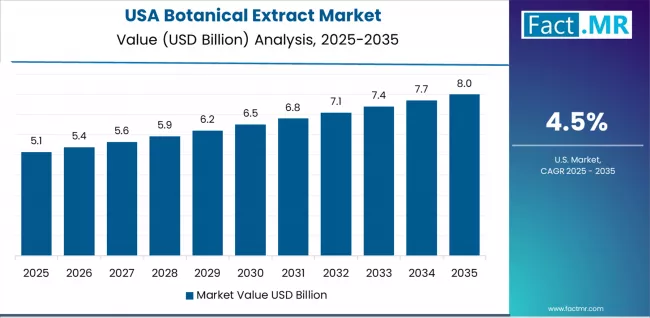
In major processing centers including California, New York, Illinois, and Texas, manufacturing facilities are implementing comprehensive botanical extract solutions to modernize existing ingredient infrastructure and improve product accuracy, with documented case studies showing a 45% improvement in natural ingredient utilization through advanced botanical systems. The market shows strong growth potential with a CAGR of 4.5% through 2035, linked to the ongoing modernization of food facilities, supplement networks, and emerging specialized processing projects in major regions. American manufacturers are adopting intelligent botanical and monitoring platforms to enhance product reliability while maintaining quality standards demanded by regulatory authorities and consumer markets. The country's established food infrastructure creates persistent demand for system upgrade and modernization solutions that integrate with existing manufacturing systems.
Market development factors:
- Manufacturing facilities and processing networks leading botanical modernization initiatives across United States
- Natural product modernization programs providing federal funding support for food and supplement infrastructure upgrades
- Strategic partnerships between American manufacturing companies and international botanical providers are expanding technical capabilities
- Focus on advanced natural product compliance and quality standards across food applications
South Korea Shows Technology-Driven Growth
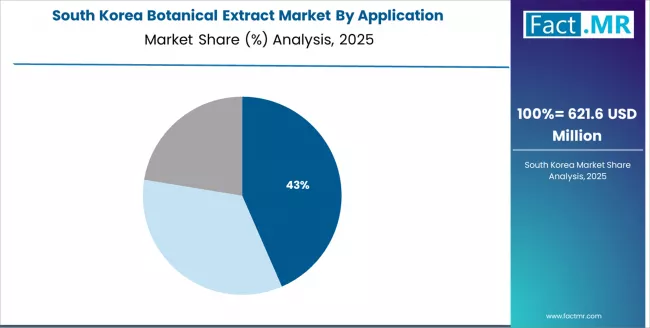
South Korea's botanical extract market demonstrates sophisticated implementation focused on advanced manufacturing technology and extraction optimization, with documented integration of advanced botanical systems, achieving 40% improvement in extract quality across food and supplement facilities. The country maintains steady growth momentum with a CAGR of 4.0% through 2035, driven by manufacturing facilities' focus on natural product innovation and continuous improvement methodologies that align with international quality requirements applied to botanical operations. Major processing areas, including Seoul, Busan, Incheon, and Daegu, showcase advanced deployment of botanical platforms where extraction systems integrate seamlessly with existing manufacturing control systems and comprehensive quality management programs.
Key market characteristics:
- Manufacturing facilities and processing centers are driving advanced botanical requirements with focus on extraction innovation and quality
- Quality management partnerships enabling 95% extract compliance with comprehensive monitoring programs
- Technology collaboration between Korean companies and international botanical providers is expanding market capabilities
- Focus on manufacturing innovation and continuous improvement methodologies
Japan Emphasizes Advanced Manufacturing Integration
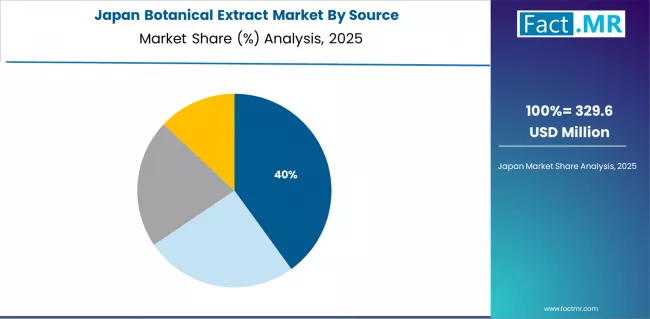
Japan's market demonstrates mature and technology-focused landscape, characterized by sophisticated integration of botanical systems with existing manufacturing infrastructure across processing facilities, pharmaceutical networks, and specialized ingredient initiatives. Japan's focus on advanced quality compliance and manufacturing standards drives demand for high-reliability botanical solutions that support comprehensive manufacturing initiatives and regulatory compliance requirements in processing operations. The market benefits from strong partnerships between international botanical providers and domestic manufacturing leaders, creating comprehensive service ecosystems that prioritize system performance and technical training programs. Processing centers in major manufacturing regions showcase advanced botanical implementations where extraction systems achieve 88% efficiency through integrated monitoring programs.
Europe Market Split by Country
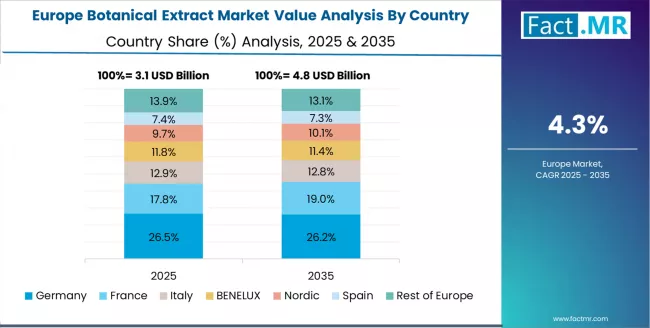
The botanical extract market in Europe is projected to grow from USD 3.0 billion in Germany in 2025, maintaining a 24.0% market share, supported by its extensive specialized manufacturing infrastructure, advanced processing facilities, and comprehensive botanical networks serving major European markets.
The UK follows with USD 2.2 billion and a 17.6% share in 2025, driven by comprehensive manufacturing programs in major processing regions implementing advanced botanical extract management systems. France holds USD 1.8 billion with a 14.4% share through the ongoing development of specialized processing facilities and advanced botanical networks. Italy commands USD 1.4 billion with a 11.2% share, while Spain accounts for USD 1.1 billion with a 8.8% share in 2025. The Rest of Europe region maintains USD 3.0 billion with a 24.0% collective share, attributed to increasing botanical adoption in Nordic countries and emerging Eastern European processing facilities implementing advanced natural product programs.
Competitive Landscape of the Botanical Extract Market
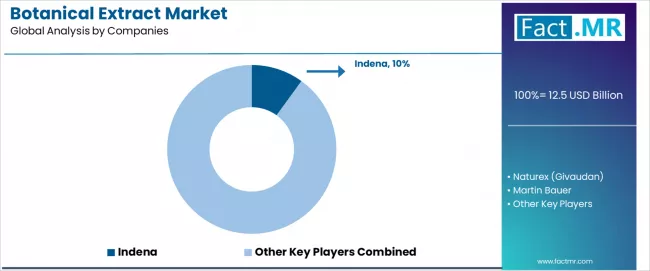
The market features approximately 20-25 meaningful players with moderate concentration, where the top three companies control roughly 25-35% of global market share through established extract product portfolios and extensive industry relationships. Competition centers on extraction efficiency, product quality, and application expertise rather than price competition alone.
Market leaders include Indena, Naturex (Givaudan), and Martin Bauer, which maintain competitive advantages through comprehensive botanical extract solution portfolios, global distribution networks, and deep expertise in the natural ingredients and processing sectors, creating high switching costs for customers. These companies leverage established manufacturer relationships and ongoing technical support services to defend market positions while expanding into adjacent ingredient and integrated formulation applications.
Challengers encompass Dohler and Kalsec, which compete through specialized extraction technologies and strong regional presence in key manufacturing markets. Extract specialists, including Synthite, Arjuna, and Vidya Herbs, focus on specific botanical technologies or specialized applications, offering differentiated capabilities in source materials, extraction methods, and application-specific solutions.
Regional players and emerging botanical companies create competitive pressure through innovative extraction methods and rapid market deployment capabilities, particularly in high-growth markets including India and China, where local presence provides advantages in raw material sourcing and regulatory compliance. Market dynamics favor companies that combine advanced extraction technologies with comprehensive application services that address the complete manufacturing lifecycle from raw material sourcing through ongoing product support and quality management.
Global Botanical Extract Market - Stakeholder Contribution Framework
Botanical extract solutions represent a critical natural ingredient technology that enables manufacturers, food companies, and formulation departments to enhance product performance and consumer appeal without substantial infrastructure requirements, typically providing 80-95% active compound concentrations comparable to synthetic alternatives while improving natural product positioning. With the market projected to grow from USD 12.5 billion in 2025 to USD 21.0 billion by 2035 at a 5.3% CAGR, these solutions offer compelling advantages - superior natural functionality, enhanced consumer appeal, and regulatory compliance capabilities - making them essential for food manufacturing (growing segment), dietary supplement operations (expanding adoption), and diverse consumer applications seeking reliable natural ingredient solutions. Scaling market penetration and botanical capabilities requires coordinated action across natural product policy, quality standards, extract manufacturers, processing technology providers, and research institutions.
How Governments Could Spur Local Production and Adoption?
- Agricultural Development Programs: Include botanical extract capabilities in national agricultural development initiatives, providing targeted funding for specialized cultivation facilities in underserved regions and supporting local extract companies through innovation grants and development support.
- Tax Policy & R&D Support: Implement accelerated depreciation schedules for extraction equipment, provide tax incentives for companies investing in advanced botanical and processing technologies, and establish favorable research accounting standards that encourage natural ingredient adoption over synthetic approaches.
- Regulatory Framework Development: Create streamlined botanical registration processes across specialized and general ingredient applications, establish clear quality testing frameworks for extract operation, and develop international harmonization protocols that facilitate cross-border botanical trade.
- Skills Development & Training: Fund vocational programs for extraction technicians, botanical specialists, and processing professionals. Invest in technology transfer initiatives that bridge academic research with commercial botanical development and quality optimization systems.
- Market Access & Competition: Establish procurement policies that favor advanced botanical solutions for government food applications, support small and medium processing operations through preferential lending programs, and create regulatory environments that encourage innovation in natural ingredient technologies.
How Industry Bodies Could Support Market Development?
- Quality Standards & Certification: Define standardized performance metrics for botanical systems across specialized, general, and integrated manufacturing applications, establish universal quality and potency protocols, and create certification programs for extract performance that manufacturers can rely on.
- Market Education & Best Practices: Lead messaging that demonstrates botanical advantages, emphasizing improved natural functionality, enhanced consumer appeal, and superior ingredient compatibility compared to synthetic alternatives.
- Technology Integration Standards: Develop interoperability standards for botanical systems, comprehensive formulation compatibility guidelines, and advanced processing platforms, ensuring seamless integration across different manufacturing environments and application requirements.
- Professional Development: Run certification programs for manufacturing practitioners, botanical specialists, and technical service teams on optimizing extract performance, quality management, and advanced formulation in competitive consumer markets.
How Manufacturers and Technology Players Could Strengthen the Ecosystem?
- Advanced Extraction Development: Develop next-generation processing technologies with enhanced extraction capabilities, improved compound stability, and application-specific botanical features that enhance formulation reliability while improving product outcomes.
- Intelligence Platforms: Provide comprehensive botanical software that integrates quality monitoring, processing timing, predictive modeling, and formulation optimization, enabling manufacturers to maximize system efficacy and operational efficiency.
- Service & Support Networks: Offer flexible support programs for manufacturing operations and formulation departments, including technical training options, botanical consultation services, and performance optimization pathways that keep extract systems current with application demands.
- Research & Development Networks: Build comprehensive R&D capabilities, collaborative botanical innovation programs, and processing development systems that ensure extract technologies maintain high performance rates and consistent quality across diverse manufacturing environments.
Key Players in the Botanical Extract Market
- Indena
- Naturex (Givaudan)
- Martin Bauer
- Dohler
- Kalsec
- Synthite
- Arjuna
- Vidya Herbs
- Sabinsa
- Bio Botanica
- Prinova
- Nexira
- Chenguang Biotech
- Sami Labs
- Xi'an Herbking
Scope of the Report
| Items | Values |
|---|---|
| Quantitative Units (2025) | USD 12.5 billion |
| Source | Herbs, Spices, Flowers, Fruits/Others |
| Application | Food & Beverage, Dietary Supplements, Cosmetics |
| Form | Powder, Liquid |
| Regions Covered | Asia Pacific, Europe, North America, Latin America, Middle East & Africa |
| Countries Covered | India, China, Mexico, Germany, USA, South Korea, Japan, and 40+ countries |
| Key Companies Profiled | Indena, Naturex (Givaudan), Martin Bauer, Dohler, Kalsec, Synthite, Arjuna, Vidya Herbs, Sabinsa, Bio Botanica |
| Additional Attributes | Dollar sales by source and application categories, regional adoption trends across Asia Pacific, Europe, and North America, competitive landscape with botanical solution providers and manufacturing companies, processing facility requirements and specifications, integration with advanced manufacturing initiatives and specialized extraction platforms. |
Botanical Extract Market by Segments
-
Source:
- Herbs
- Spices
- Flowers
- Fruits/Others
-
Application:
- Food & Beverage
- Dietary Supplements
- Cosmetics
-
Form:
- Powder
- Liquid
-
Region:
- Asia Pacific
- China
- Japan
- South Korea
- India
- Australia & New Zealand
- ASEAN
- Rest of Asia Pacific
- Europe
- Germany
- United Kingdom
- France
- Italy
- Spain
- Nordic
- BENELUX
- Rest of Europe
- North America
- United States
- Canada
- Mexico
- Latin America
- Brazil
- Chile
- Rest of Latin America
- Middle East & Africa
- Kingdom of Saudi Arabia
- Other GCC Countries
- Turkey
- South Africa
- Other African Union
- Rest of Middle East & Africa
- Asia Pacific
Table of Content
- Executive Summary
- Global Market Outlook
- Demand to side Trends
- Supply to side Trends
- Technology Roadmap Analysis
- Analysis and Recommendations
- Market Overview
- Market Coverage / Taxonomy
- Market Definition / Scope / Limitations
- Market Background
- Market Dynamics
- Drivers
- Restraints
- Opportunity
- Trends
- Scenario Forecast
- Demand in Optimistic Scenario
- Demand in Likely Scenario
- Demand in Conservative Scenario
- Opportunity Map Analysis
- Product Life Cycle Analysis
- Supply Chain Analysis
- Investment Feasibility Matrix
- Value Chain Analysis
- PESTLE and Porter’s Analysis
- Regulatory Landscape
- Regional Parent Market Outlook
- Production and Consumption Statistics
- Import and Export Statistics
- Market Dynamics
- Global Market Analysis 2020 to 2024 and Forecast, 2025 to 2035
- Historical Market Size Value (USD Million) Analysis, 2020 to 2024
- Current and Future Market Size Value (USD Million) Projections, 2025 to 2035
- Y to o to Y Growth Trend Analysis
- Absolute $ Opportunity Analysis
- Global Market Pricing Analysis 2020 to 2024 and Forecast 2025 to 2035
- Global Market Analysis 2020 to 2024 and Forecast 2025 to 2035, By Source
- Introduction / Key Findings
- Historical Market Size Value (USD Million) Analysis By Source , 2020 to 2024
- Current and Future Market Size Value (USD Million) Analysis and Forecast By Source , 2025 to 2035
- Herbs
- Spices
- Flowers
- Fruits/Others
- Y to o to Y Growth Trend Analysis By Source , 2020 to 2024
- Absolute $ Opportunity Analysis By Source , 2025 to 2035
- Global Market Analysis 2020 to 2024 and Forecast 2025 to 2035, By Application
- Introduction / Key Findings
- Historical Market Size Value (USD Million) Analysis By Application, 2020 to 2024
- Current and Future Market Size Value (USD Million) Analysis and Forecast By Application, 2025 to 2035
- Food & Beverage
- Dietary Supplements
- Cosmetics
- Y to o to Y Growth Trend Analysis By Application, 2020 to 2024
- Absolute $ Opportunity Analysis By Application, 2025 to 2035
- Global Market Analysis 2020 to 2024 and Forecast 2025 to 2035, By Form
- Introduction / Key Findings
- Historical Market Size Value (USD Million) Analysis By Form, 2020 to 2024
- Current and Future Market Size Value (USD Million) Analysis and Forecast By Form, 2025 to 2035
- Powder
- Liquid
- Y to o to Y Growth Trend Analysis By Form, 2020 to 2024
- Absolute $ Opportunity Analysis By Form, 2025 to 2035
- Global Market Analysis 2020 to 2024 and Forecast 2025 to 2035, By Region
- Introduction
- Historical Market Size Value (USD Million) Analysis By Region, 2020 to 2024
- Current Market Size Value (USD Million) Analysis and Forecast By Region, 2025 to 2035
- North America
- Latin America
- Western Europe
- Eastern Europe
- East Asia
- South Asia and Pacific
- Middle East & Africa
- Market Attractiveness Analysis By Region
- North America Market Analysis 2020 to 2024 and Forecast 2025 to 2035, By Country
- Historical Market Size Value (USD Million) Trend Analysis By Market Taxonomy, 2020 to 2024
- Market Size Value (USD Million) Forecast By Market Taxonomy, 2025 to 2035
- By Country
- USA
- Canada
- Mexico
- By Source
- By Application
- By Form
- By Country
- Market Attractiveness Analysis
- By Country
- By Source
- By Application
- By Form
- Key Takeaways
- Latin America Market Analysis 2020 to 2024 and Forecast 2025 to 2035, By Country
- Historical Market Size Value (USD Million) Trend Analysis By Market Taxonomy, 2020 to 2024
- Market Size Value (USD Million) Forecast By Market Taxonomy, 2025 to 2035
- By Country
- Brazil
- Chile
- Rest of Latin America
- By Source
- By Application
- By Form
- By Country
- Market Attractiveness Analysis
- By Country
- By Source
- By Application
- By Form
- Key Takeaways
- Western Europe Market Analysis 2020 to 2024 and Forecast 2025 to 2035, By Country
- Historical Market Size Value (USD Million) Trend Analysis By Market Taxonomy, 2020 to 2024
- Market Size Value (USD Million) Forecast By Market Taxonomy, 2025 to 2035
- By Country
- Germany
- UK
- Italy
- Spain
- France
- Nordic
- BENELUX
- Rest of Western Europe
- By Source
- By Application
- By Form
- By Country
- Market Attractiveness Analysis
- By Country
- By Source
- By Application
- By Form
- Key Takeaways
- Eastern Europe Market Analysis 2020 to 2024 and Forecast 2025 to 2035, By Country
- Historical Market Size Value (USD Million) Trend Analysis By Market Taxonomy, 2020 to 2024
- Market Size Value (USD Million) Forecast By Market Taxonomy, 2025 to 2035
- By Country
- Russia
- Poland
- Hungary
- Balkan & Baltic
- Rest of Eastern Europe
- By Source
- By Application
- By Form
- By Country
- Market Attractiveness Analysis
- By Country
- By Source
- By Application
- By Form
- Key Takeaways
- East Asia Market Analysis 2020 to 2024 and Forecast 2025 to 2035, By Country
- Historical Market Size Value (USD Million) Trend Analysis By Market Taxonomy, 2020 to 2024
- Market Size Value (USD Million) Forecast By Market Taxonomy, 2025 to 2035
- By Country
- China
- Japan
- South Korea
- By Source
- By Application
- By Form
- By Country
- Market Attractiveness Analysis
- By Country
- By Source
- By Application
- By Form
- Key Takeaways
- South Asia and Pacific Market Analysis 2020 to 2024 and Forecast 2025 to 2035, By Country
- Historical Market Size Value (USD Million) Trend Analysis By Market Taxonomy, 2020 to 2024
- Market Size Value (USD Million) Forecast By Market Taxonomy, 2025 to 2035
- By Country
- India
- ASEAN
- Australia & New Zealand
- Rest of South Asia and Pacific
- By Source
- By Application
- By Form
- By Country
- Market Attractiveness Analysis
- By Country
- By Source
- By Application
- By Form
- Key Takeaways
- Middle East & Africa Market Analysis 2020 to 2024 and Forecast 2025 to 2035, By Country
- Historical Market Size Value (USD Million) Trend Analysis By Market Taxonomy, 2020 to 2024
- Market Size Value (USD Million) Forecast By Market Taxonomy, 2025 to 2035
- By Country
- Kingdom of Saudi Arabia
- Other GCC Countries
- Turkiye
- South Africa
- Other African Union
- Rest of Middle East & Africa
- By Source
- By Application
- By Form
- By Country
- Market Attractiveness Analysis
- By Country
- By Source
- By Application
- By Form
- Key Takeaways
- Key Countries Market Analysis
- USA
- Pricing Analysis
- Market Share Analysis, 2024
- By Source
- By Application
- By Form
- Canada
- Pricing Analysis
- Market Share Analysis, 2024
- By Source
- By Application
- By Form
- Mexico
- Pricing Analysis
- Market Share Analysis, 2024
- By Source
- By Application
- By Form
- Brazil
- Pricing Analysis
- Market Share Analysis, 2024
- By Source
- By Application
- By Form
- Chile
- Pricing Analysis
- Market Share Analysis, 2024
- By Source
- By Application
- By Form
- Germany
- Pricing Analysis
- Market Share Analysis, 2024
- By Source
- By Application
- By Form
- UK
- Pricing Analysis
- Market Share Analysis, 2024
- By Source
- By Application
- By Form
- Italy
- Pricing Analysis
- Market Share Analysis, 2024
- By Source
- By Application
- By Form
- Spain
- Pricing Analysis
- Market Share Analysis, 2024
- By Source
- By Application
- By Form
- France
- Pricing Analysis
- Market Share Analysis, 2024
- By Source
- By Application
- By Form
- India
- Pricing Analysis
- Market Share Analysis, 2024
- By Source
- By Application
- By Form
- ASEAN
- Pricing Analysis
- Market Share Analysis, 2024
- By Source
- By Application
- By Form
- Australia & New Zealand
- Pricing Analysis
- Market Share Analysis, 2024
- By Source
- By Application
- By Form
- China
- Pricing Analysis
- Market Share Analysis, 2024
- By Source
- By Application
- By Form
- Japan
- Pricing Analysis
- Market Share Analysis, 2024
- By Source
- By Application
- By Form
- South Korea
- Pricing Analysis
- Market Share Analysis, 2024
- By Source
- By Application
- By Form
- Russia
- Pricing Analysis
- Market Share Analysis, 2024
- By Source
- By Application
- By Form
- Poland
- Pricing Analysis
- Market Share Analysis, 2024
- By Source
- By Application
- By Form
- Hungary
- Pricing Analysis
- Market Share Analysis, 2024
- By Source
- By Application
- By Form
- Kingdom of Saudi Arabia
- Pricing Analysis
- Market Share Analysis, 2024
- By Source
- By Application
- By Form
- Turkiye
- Pricing Analysis
- Market Share Analysis, 2024
- By Source
- By Application
- By Form
- South Africa
- Pricing Analysis
- Market Share Analysis, 2024
- By Source
- By Application
- By Form
- USA
- Market Structure Analysis
- Competition Dashboard
- Competition Benchmarking
- Market Share Analysis of Top Players
- By Regional
- By Source
- By Application
- By Form
- Competition Analysis
- Competition Deep Dive
- Indena
- Overview
- Product Portfolio
- Profitability by Market Segments (Product/Age /Sales Channel/Region)
- Sales Footprint
- Strategy Overview
- Marketing Strategy
- Product Strategy
- Channel Strategy
- Naturex (Givaudan)
- Martin Bauer
- Dohler
- Kalsec
- Synthite
- Arjuna
- Vidya Herbs
- Sabinsa
- Bio Botanica
- Prinova
- Nexira
- Chenguang Biotech
- Sami Labs
- Xi'an Herbking
- Indena
- Competition Deep Dive
- Assumptions & Acronyms Used
- Research Methodology
List Of Table
- Table 1: Global Market Value (USD Million) Forecast by Region, 2020 to 2035
- Table 2: Global Market Value (USD Million) Forecast by Source , 2020 to 2035
- Table 3: Global Market Value (USD Million) Forecast by Application, 2020 to 2035
- Table 4: Global Market Value (USD Million) Forecast by Form, 2020 to 2035
- Table 5: North America Market Value (USD Million) Forecast by Country, 2020 to 2035
- Table 6: North America Market Value (USD Million) Forecast by Source , 2020 to 2035
- Table 7: North America Market Value (USD Million) Forecast by Application, 2020 to 2035
- Table 8: North America Market Value (USD Million) Forecast by Form, 2020 to 2035
- Table 9: Latin America Market Value (USD Million) Forecast by Country, 2020 to 2035
- Table 10: Latin America Market Value (USD Million) Forecast by Source , 2020 to 2035
- Table 11: Latin America Market Value (USD Million) Forecast by Application, 2020 to 2035
- Table 12: Latin America Market Value (USD Million) Forecast by Form, 2020 to 2035
- Table 13: Western Europe Market Value (USD Million) Forecast by Country, 2020 to 2035
- Table 14: Western Europe Market Value (USD Million) Forecast by Source , 2020 to 2035
- Table 15: Western Europe Market Value (USD Million) Forecast by Application, 2020 to 2035
- Table 16: Western Europe Market Value (USD Million) Forecast by Form, 2020 to 2035
- Table 17: Eastern Europe Market Value (USD Million) Forecast by Country, 2020 to 2035
- Table 18: Eastern Europe Market Value (USD Million) Forecast by Source , 2020 to 2035
- Table 19: Eastern Europe Market Value (USD Million) Forecast by Application, 2020 to 2035
- Table 20: Eastern Europe Market Value (USD Million) Forecast by Form, 2020 to 2035
- Table 21: East Asia Market Value (USD Million) Forecast by Country, 2020 to 2035
- Table 22: East Asia Market Value (USD Million) Forecast by Source , 2020 to 2035
- Table 23: East Asia Market Value (USD Million) Forecast by Application, 2020 to 2035
- Table 24: East Asia Market Value (USD Million) Forecast by Form, 2020 to 2035
- Table 25: South Asia and Pacific Market Value (USD Million) Forecast by Country, 2020 to 2035
- Table 26: South Asia and Pacific Market Value (USD Million) Forecast by Source , 2020 to 2035
- Table 27: South Asia and Pacific Market Value (USD Million) Forecast by Application, 2020 to 2035
- Table 28: South Asia and Pacific Market Value (USD Million) Forecast by Form, 2020 to 2035
- Table 29: Middle East & Africa Market Value (USD Million) Forecast by Country, 2020 to 2035
- Table 30: Middle East & Africa Market Value (USD Million) Forecast by Source , 2020 to 2035
- Table 31: Middle East & Africa Market Value (USD Million) Forecast by Application, 2020 to 2035
- Table 32: Middle East & Africa Market Value (USD Million) Forecast by Form, 2020 to 2035
List Of Figures
- Figure 1: Global Market Pricing Analysis
- Figure 2: Global Market Value (USD Million) Forecast 2020-2035
- Figure 3: Global Market Value Share and BPS Analysis by Source , 2025 and 2035
- Figure 4: Global Market Y to o to Y Growth Comparison by Source , 2025-2035
- Figure 5: Global Market Attractiveness Analysis by Source
- Figure 6: Global Market Value Share and BPS Analysis by Application, 2025 and 2035
- Figure 7: Global Market Y to o to Y Growth Comparison by Application, 2025-2035
- Figure 8: Global Market Attractiveness Analysis by Application
- Figure 9: Global Market Value Share and BPS Analysis by Form, 2025 and 2035
- Figure 10: Global Market Y to o to Y Growth Comparison by Form, 2025-2035
- Figure 11: Global Market Attractiveness Analysis by Form
- Figure 12: Global Market Value (USD Million) Share and BPS Analysis by Region, 2025 and 2035
- Figure 13: Global Market Y to o to Y Growth Comparison by Region, 2025-2035
- Figure 14: Global Market Attractiveness Analysis by Region
- Figure 15: North America Market Incremental Dollar Opportunity, 2025-2035
- Figure 16: Latin America Market Incremental Dollar Opportunity, 2025-2035
- Figure 17: Western Europe Market Incremental Dollar Opportunity, 2025-2035
- Figure 18: Eastern Europe Market Incremental Dollar Opportunity, 2025-2035
- Figure 19: East Asia Market Incremental Dollar Opportunity, 2025-2035
- Figure 20: South Asia and Pacific Market Incremental Dollar Opportunity, 2025-2035
- Figure 21: Middle East & Africa Market Incremental Dollar Opportunity, 2025-2035
- Figure 22: North America Market Value Share and BPS Analysis by Country, 2025 and 2035
- Figure 23: North America Market Value Share and BPS Analysis by Source , 2025 and 2035
- Figure 24: North America Market Y to o to Y Growth Comparison by Source , 2025-2035
- Figure 25: North America Market Attractiveness Analysis by Source
- Figure 26: North America Market Value Share and BPS Analysis by Application, 2025 and 2035
- Figure 27: North America Market Y to o to Y Growth Comparison by Application, 2025-2035
- Figure 28: North America Market Attractiveness Analysis by Application
- Figure 29: North America Market Value Share and BPS Analysis by Form, 2025 and 2035
- Figure 30: North America Market Y to o to Y Growth Comparison by Form, 2025-2035
- Figure 31: North America Market Attractiveness Analysis by Form
- Figure 32: Latin America Market Value Share and BPS Analysis by Country, 2025 and 2035
- Figure 33: Latin America Market Value Share and BPS Analysis by Source , 2025 and 2035
- Figure 34: Latin America Market Y to o to Y Growth Comparison by Source , 2025-2035
- Figure 35: Latin America Market Attractiveness Analysis by Source
- Figure 36: Latin America Market Value Share and BPS Analysis by Application, 2025 and 2035
- Figure 37: Latin America Market Y to o to Y Growth Comparison by Application, 2025-2035
- Figure 38: Latin America Market Attractiveness Analysis by Application
- Figure 39: Latin America Market Value Share and BPS Analysis by Form, 2025 and 2035
- Figure 40: Latin America Market Y to o to Y Growth Comparison by Form, 2025-2035
- Figure 41: Latin America Market Attractiveness Analysis by Form
- Figure 42: Western Europe Market Value Share and BPS Analysis by Country, 2025 and 2035
- Figure 43: Western Europe Market Value Share and BPS Analysis by Source , 2025 and 2035
- Figure 44: Western Europe Market Y to o to Y Growth Comparison by Source , 2025-2035
- Figure 45: Western Europe Market Attractiveness Analysis by Source
- Figure 46: Western Europe Market Value Share and BPS Analysis by Application, 2025 and 2035
- Figure 47: Western Europe Market Y to o to Y Growth Comparison by Application, 2025-2035
- Figure 48: Western Europe Market Attractiveness Analysis by Application
- Figure 49: Western Europe Market Value Share and BPS Analysis by Form, 2025 and 2035
- Figure 50: Western Europe Market Y to o to Y Growth Comparison by Form, 2025-2035
- Figure 51: Western Europe Market Attractiveness Analysis by Form
- Figure 52: Eastern Europe Market Value Share and BPS Analysis by Country, 2025 and 2035
- Figure 53: Eastern Europe Market Value Share and BPS Analysis by Source , 2025 and 2035
- Figure 54: Eastern Europe Market Y to o to Y Growth Comparison by Source , 2025-2035
- Figure 55: Eastern Europe Market Attractiveness Analysis by Source
- Figure 56: Eastern Europe Market Value Share and BPS Analysis by Application, 2025 and 2035
- Figure 57: Eastern Europe Market Y to o to Y Growth Comparison by Application, 2025-2035
- Figure 58: Eastern Europe Market Attractiveness Analysis by Application
- Figure 59: Eastern Europe Market Value Share and BPS Analysis by Form, 2025 and 2035
- Figure 60: Eastern Europe Market Y to o to Y Growth Comparison by Form, 2025-2035
- Figure 61: Eastern Europe Market Attractiveness Analysis by Form
- Figure 62: East Asia Market Value Share and BPS Analysis by Country, 2025 and 2035
- Figure 63: East Asia Market Value Share and BPS Analysis by Source , 2025 and 2035
- Figure 64: East Asia Market Y to o to Y Growth Comparison by Source , 2025-2035
- Figure 65: East Asia Market Attractiveness Analysis by Source
- Figure 66: East Asia Market Value Share and BPS Analysis by Application, 2025 and 2035
- Figure 67: East Asia Market Y to o to Y Growth Comparison by Application, 2025-2035
- Figure 68: East Asia Market Attractiveness Analysis by Application
- Figure 69: East Asia Market Value Share and BPS Analysis by Form, 2025 and 2035
- Figure 70: East Asia Market Y to o to Y Growth Comparison by Form, 2025-2035
- Figure 71: East Asia Market Attractiveness Analysis by Form
- Figure 72: South Asia and Pacific Market Value Share and BPS Analysis by Country, 2025 and 2035
- Figure 73: South Asia and Pacific Market Value Share and BPS Analysis by Source , 2025 and 2035
- Figure 74: South Asia and Pacific Market Y to o to Y Growth Comparison by Source , 2025-2035
- Figure 75: South Asia and Pacific Market Attractiveness Analysis by Source
- Figure 76: South Asia and Pacific Market Value Share and BPS Analysis by Application, 2025 and 2035
- Figure 77: South Asia and Pacific Market Y to o to Y Growth Comparison by Application, 2025-2035
- Figure 78: South Asia and Pacific Market Attractiveness Analysis by Application
- Figure 79: South Asia and Pacific Market Value Share and BPS Analysis by Form, 2025 and 2035
- Figure 80: South Asia and Pacific Market Y to o to Y Growth Comparison by Form, 2025-2035
- Figure 81: South Asia and Pacific Market Attractiveness Analysis by Form
- Figure 82: Middle East & Africa Market Value Share and BPS Analysis by Country, 2025 and 2035
- Figure 83: Middle East & Africa Market Value Share and BPS Analysis by Source , 2025 and 2035
- Figure 84: Middle East & Africa Market Y to o to Y Growth Comparison by Source , 2025-2035
- Figure 85: Middle East & Africa Market Attractiveness Analysis by Source
- Figure 86: Middle East & Africa Market Value Share and BPS Analysis by Application, 2025 and 2035
- Figure 87: Middle East & Africa Market Y to o to Y Growth Comparison by Application, 2025-2035
- Figure 88: Middle East & Africa Market Attractiveness Analysis by Application
- Figure 89: Middle East & Africa Market Value Share and BPS Analysis by Form, 2025 and 2035
- Figure 90: Middle East & Africa Market Y to o to Y Growth Comparison by Form, 2025-2035
- Figure 91: Middle East & Africa Market Attractiveness Analysis by Form
- Figure 92: Global Market - Tier Structure Analysis
- Figure 93: Global Market - Company Share Analysis
- FAQs -
How big is the botanical extract market in 2025?
The global botanical extract market is estimated to be valued at USD 12.5 billion in 2025.
What will be the size of botanical extract market in 2035?
The market size for the botanical extract market is projected to reach USD 21.0 billion by 2035.
How much will be the botanical extract market growth between 2025 and 2035?
The botanical extract market is expected to grow at a 5.3% CAGR between 2025 and 2035.
What are the key product types in the botanical extract market?
The key product types in botanical extract market are herbs, spices, flowers and fruits/others.
Which application segment to contribute significant share in the botanical extract market in 2025?
In terms of application, food & beverage segment to command 45.0% share in the botanical extract market in 2025.